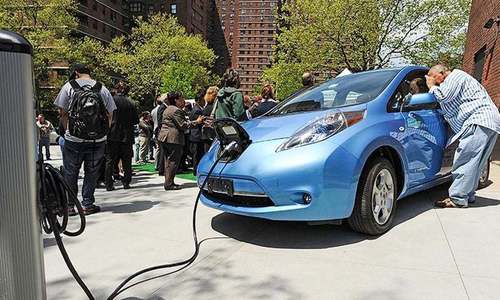According to a report from the Asian Development Bank (ADB), Pakistan needs to install 25,000 charging stations by 2030 to support the adoption of Electric Vehicles. The report suggests that the government should develop a comprehensive plan for the deployment of charging infrastructure and work with private sector companies for investment.
The adoption of EVs has the potential to reduce dependence on imported oil, which currently accounts for a significant portion of the country’s import bill.
According to the annual report of the State Bank of Pakistan (SBP), the country spent $10.589 billion on crude oil and LNG imports in FY2021-22, which is almost 13.5% of the total import bill.
This will lead to a significant reduction in the trade deficit, which will have a positive impact on the balance of payments.
Representatives from Pakistan participated in the Green Grids Initiative, which included informing lawmakers on renewable power integration. The program also encouraged dealers and manufacturers of electric vehicles to lower their prices to encourage more customers. The Federal Cabinet approved a plan by the Pakistani Minister to promote electric vehicle importation and production. Pakistan’s major HEV manufacturers were Honda and Toyota. Karakoram Motor is Pakistan’s sole manufacturer of BEVs.
Moreover, the adoption of EVs will create new employment opportunities in the manufacturing, sales, and service sectors. The production of EVs and their components will require a skilled workforce, and the growth of the sector will create new jobs in related industries, such as charging infrastructure, battery production, and software development.
According to a report from the International Renewable Energy Agency (IRENA), the renewable energy sector, including EVs, is expected to create over 100,000 jobs in Pakistan by 2030.
However, the International Energy Agency (IEA) estimates that the global EV market will support 14 million jobs by 2030. This includes direct jobs in the manufacturing, maintenance, and operation of EVs, as well as indirect jobs in the supply chain and service sectors.
The adoption of Hybrid Vehicles by Pakistani Consumers was studied. In this study, we found that consumer attitudes regarding hybrid electric cars, subjective standards, and personal moral norms all play a role in determining whether or not they plan to use or embrace HEVs. Due to the favorable effects on attitudes toward HEVs, personal norms, and subjective standards that come from environmental concerns among consumers, consumers’ willingness to adapt to new technologies is influenced positively.
According to a report published in 2021 by the World Health Organisation (WHO), air pollution caused an estimated 64,000 premature deaths in Pakistan in 2019. The transport sector is a significant contributor to air pollution in urban areas, and the adoption of EVs can help reduce this impact.
EVs emit significantly fewer greenhouse gases than traditional gasoline-powered vehicles, and they produce no tailpipe emissions. As such, the adoption of EVs will help reduce air pollution in urban areas, which is a major public health concern in Pakistan.
According to a report by IEA, the adoption of EVs could reduce global CO2 emissions by up to 1.5 gigatons by 2030. In Pakistan, the adoption of EVs could help the country reduce its greenhouse gas emissions and meet its commitments under the Paris Agreement.
According to the World Resources Institute, Pakistan is one of the most water-stressed countries in the world, with only 1,017 cubic meters of water available per person per year.
The production of EVs requires less water than traditional vehicles, which will help conserve water resources in a country that is facing acute water scarcity.
Despite the potential benefits of EVs, several hurdles need to be overcome to ensure the continued growth of the sector. One of the biggest challenges is the lack of charging infrastructure.
EVs require a network of charging stations that are conveniently located and easily accessible to users. However, in Pakistan, the availability of charging infrastructure is limited, and most EV owners have to rely on home charging or slow public charging stations.
The lack of charging infrastructure is a significant barrier to the adoption of EVs, as it limits the range and usability of EVs.
EVs have higher fuel efficiency, with an average range of 300-400 km per charge, and require less maintenance, with maintenance costs being 50-70% lower than conventional vehicles.
They have lower operational costs, with an average charging cost of Rs400 for a 100km distance, which is 70-80% lower than the fuel cost of conventional vehicles. EVs have the potential to reduce emissions by 90% and improve air quality in cities.
Another hurdle to the adoption of EVs is the cost. EVs are generally more expensive than traditional gasoline-powered vehicles, and this can be a significant barrier to adoption in a country where a majority of the population falls in the low to middle-income category.
The cost of EVs is expected to decline in the coming years as battery technology improves and economies of scale are achieved. According to a report by IRENA, the cost of lithium-ion batteries used in EVs is expected to decline by up to 66% by 2030.
Finally, the adoption of EVs requires strong government support. The government must provide incentives and policies to promote the growth of the EV industry, such as tax exemptions, subsidies, and public procurement programs.
To increase EV purchasing intent and promote EV development in Pakistan, we may have to make some important policy suggestions as a result of our findings which offer key insights for the rapid adoption and acceptance future of electric vehicles.
Read More:





 Looking For The Perfect Home Tutor In Karachi, Islamabad, or Lahore? Here Is The Best Place to Find One
Looking For The Perfect Home Tutor In Karachi, Islamabad, or Lahore? Here Is The Best Place to Find One